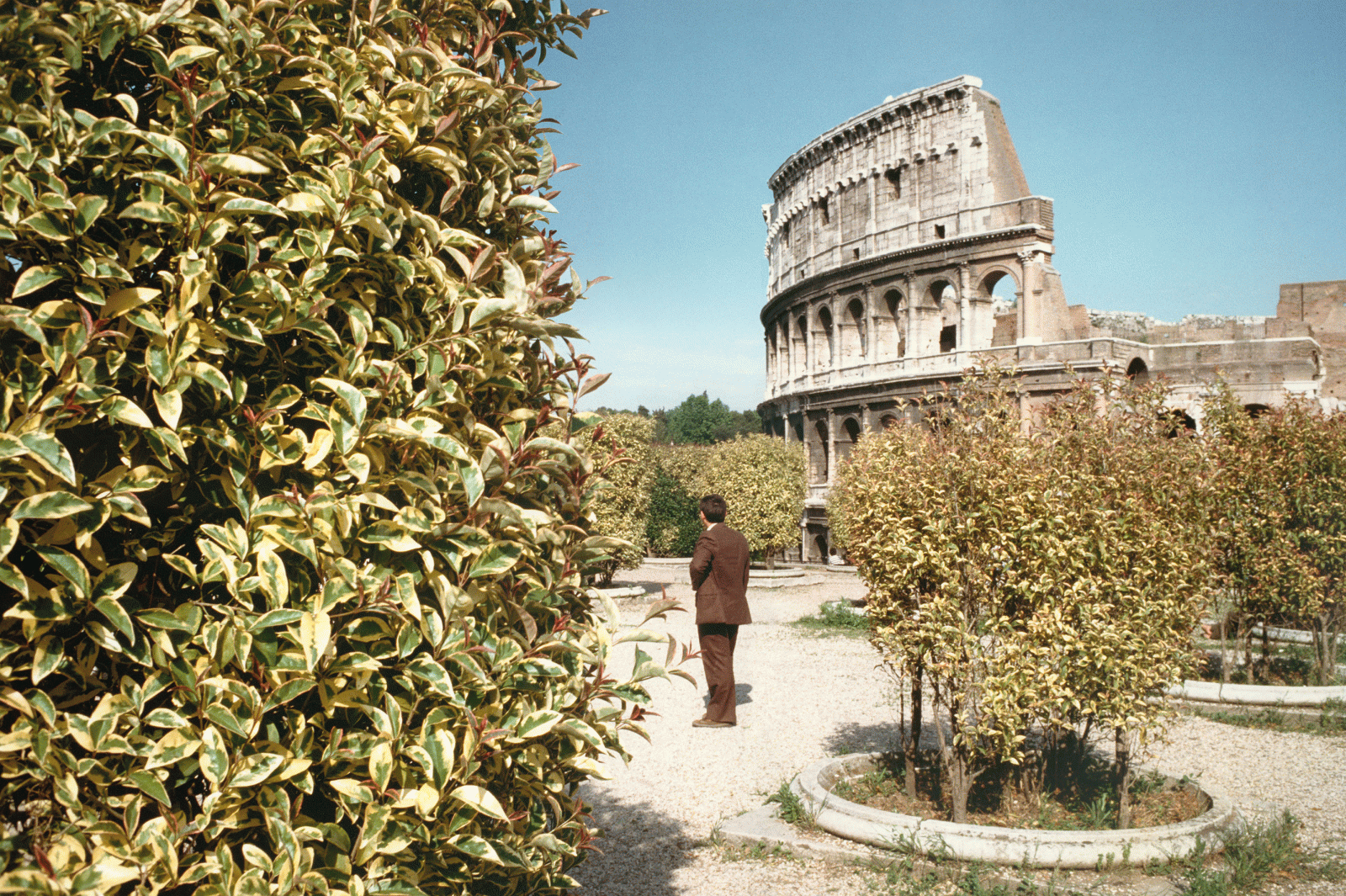Tagung
Against Identity? Discourses of Art History and Visual Culture in Italy
Doctoral and Early Career Researchers Conference
Florence + online

Luigi Ghirri, Roma, 1979. © Eredi di Luigi Ghirri
Even though use of the term ‘identity’ has increased exponentially in the field of art history, it remains a fluid, controversial, and potentially toxic category. Considering the specificities of Italian art and visual culture, the workshop will focus on the concept of ‘identity’, investigating its definitions, its uses, and the problems they pose, by analyzing works of art and artistic phenomena across the centuries (from the Middle Ages to Modernity) in relation to historiographical and methodological discourses.
Program
All times CET (Florence time)
09.12.2021
09:15 Gerhard Wolf — Saluti
09:30 Davide Ferri, Giada Policicchio — Introduzione
Storiografie: storia dell’arte, politica, patrimonio (Chair: Giovanna Targia)
10:00 Daniele Di Cola (Fondazione Licia e Carlo Ludovico Ragghianti / Koninklijk Nederlands Instituut, Roma) — Oltre l’autoctono. Gustave Soulier e il problema dell’italianità in Les Influences orientales dans la peinture toscane (1924)
10:30 Matthew Worsnick (Vanderbilt University, Nashville) — «The hardy trunk of romanità»: Justifying Fascist Plunder through Byzantine Historiography
11:00 Valeria Sedlerenok (Università degli Studi di Bari Aldo Moro) — Conservare e promuovere: l’identità culturale e il patrimonio artistico della Serenissima a Venezia all’inizio dell’Ottocento
11:30 pausa
12:00 Nicoletta Usai (Università degli Studi di Cagliari) — Riscoperta del Medioevo e costruzione di identità nella Sardegna ottocentesca: dagli studi del canonico Giovanni Spano alle azioni di tutela di Filippo Vivanet
12:30 Tomáš Murár (Institute of Art History of the Czech Academy of Sciences, Prague) — Michelangelo and the Concept of Identity in Austrian Art History
13:00 Lucia Mallart (Universitat Pompeu Fabra, Barcelona) — The Place of ‘Italian’ Art in the Iconographic Repertoire of Spain: Renaissance, Baroque, and Identity Politics in Modern Catalonia (1915–1923) [This talk has been cancelled]
13:30 pranzo
Narrazioni espositive: collezioni, mostre, musei (Chair: Carmen Belmonte)
15:00 Elisa Bernard (IMT School for Advanced Studies, Lucca) — Against Identity: Stability and Change in Museum Institutions
15:30 Francesca Campani (Università degli Studi di Padova) — «Noi altri, gente pudica». La collezione di oggetti sessuali di Paolo Mantegazza e la costruzione delle moderne identità sessuali nell’Italia tra Otto e Novecento
16:00 pausa
16:30 Lucia Colombari (University of Virginia) — Contrasting Identities: Exhibiting Italy at the 1915 Panama-Pacific International Exposition in San Francisco
17:00 Matilde Cartolari (Technische Universität Berlin / Università di Udine) — Performativity, Rituality, and Display: Old Master Exhibitions and the Italian Identity during the Fascist Age
10.12.2021
Costruzioni del «sè»: artisti, scuole, committenti (Chair: Katharine Stahlbuhk)
09:30 Jessica Ferrari (Università degli Studi di Milano) — Al di là delle «scuole regionali». Il caso di Piacenza nella prima età comunale
10:00 Anne Bloemacher (Westfälische Wilhelms-Universität Münster) — (Fe)male Identity: Diana Scultori’s Hands and the Self-Construction of an Early Modern Female Printmaker
10:30 Lunarita Sterpetti (Sapienza Università di Roma / KHI–MPI) — Esporre l’immagine dell’assolutismo mediceo: implicazioni di un simbolo tra XVI e XXI secolo
11:00 pausa
11:30 Jessica Calipari (ricercatrice indipendente) — Monumenti d’artista e biografie dipinte nell’Italia del XIX secolo: fra genius loci e nation building
12:00 Giulia Murace (Universidad Nacional de San Martín, Buenos Aires / CONICET) — «A Roma ognuno trova la sua patria ideale»: l’arte dei primi del Novecento attraverso le esperienze rioplatensi
12:30 Giorgio Motisi (Scuola Normale Superiore, Pisa) — Al di là del volto. Ritratto e identità nel gruppo di «Corrente»
13:00 pranzo
Genius loci: geografie, territori, luoghi (Chair: Julie Deschepper)
14:30 Elvira Miceli (University of Oxford) — The Liber ad honorem Augusti (Bern, Burgerbibliothek, Cod. 120 II) and the Problem of Sicilian Art
15:00 Elisa Stafferini (The Warburg Institute, London) — The Ambiguity of Rome’s Foundation Myth and Its Protagonists in Early Modern Italian Art
15:30 Leah Marangos (University of California, Los Angeles) — Mapping Armenia from Istanbul to Bologna: The Tabula Chorographica Armenica (1691)
16:00 pausa
16:30 Viviana Costagliola (Bibliotheca Hertziana – Max-Planck-Institut für Kunstgeschichte, Roma) — La costruzione dell’identità collettiva del Meridione attraverso le fotografie del Touring Club Italiano (1899–1915)
17:00 Paolo Villa (Università degli Studi di Udine) — Questa piazza al mondo intero. Le molteplici identità della piazza italiana nel cinema
17:30 discussione finale
Downloads
09. – 10. Dezember 2021
This event will take place in person at the Kunsthistorisches Institut in Florenz and online.
For online attendance via Zoom please register here:
https://zoom.us/meeting/register/tJEqdeqsqTsuH9GQzBNlrE9C7m6-W15fLwVF
After registering, you will receive a confirmation email containing information about joining the meeting.
If you encounter any difficulties during the registration process, please contact info@khi.fi.it.
Please note that in person attendance will be for speakers and guests only.
Hinweis
Diese Veranstaltung wird durch Fotografien und/oder Videoaufnahmen dokumentiert. Falls es nicht Ihre Zustimmung findet, dass das Kunsthistorische Institut in Florenz Aufnahmen, auf denen Sie erkennbar abgebildet sein könnten, für die Veranstaltungsdokumentation und Öffentlichkeitsarbeit (z.B. Social Media) verwendet, bitten wir um eine entsprechende Rückmeldung.


